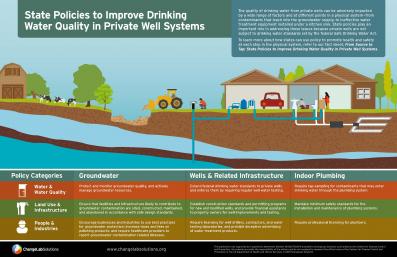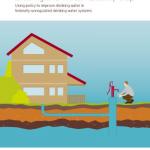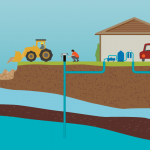From Source to Tap
State policies to improve drinking water quality in private well systems
Private well systems deliver drinking water to more than 40 million Americans. Because these wells are not regulated by the federal Safe Drinking Water Act, state policies play an important role in protecting residents from exposure to harmful bacteria, nitrates, and arsenic.
The quality of drinking water from private wells can be adversely affected by a wide range of factors and at different points in a physical system — from industrial contaminants that leach into the groundwater supply to unsafe well infrastructure to unsafe or ineffective water treatment equipment installed under a kitchen sink.
ChangeLab Solutions created this fact sheet and accompanying infographic to provide environmental and public health professionals with a map that identifies how state-level policy tools can be applied to each physical component of private well systems (groundwater, wells and related infrastructure, and indoor plumbing) to improve drinking water quality and promote community health. These resources include examples from jurisdictions around the country that demonstrate the use of each of the suggested policy tools. The policy tools are grouped according to who or what they regulate: water and water quality, land use and infrastructure, and people and industries.
This publication was supported by Cooperative Agreement Number NU38OT000141 awarded to ChangeLab Solutions and funded by the Centers for Disease Control and Prevention.




